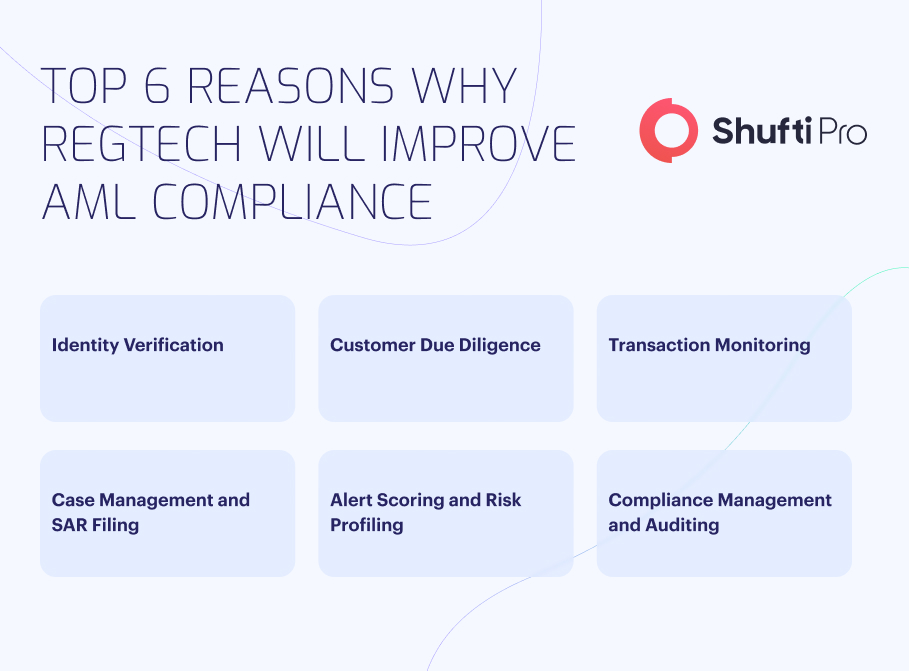Top 6 Reasons Why RegTech Will Improve AML Compliance

Global fines imposed to deter money laundering increased by 50% in 2022, alarming businesses that large penalties have not diminished financial crime financial crimes. Meanwhile, the changing regulatory landscape has made it challenging for banks and other financial firms to keep up with Anti Money Laundering (AML) requirements, particularly for those still using manual processes.
Businesses are rapidly turning towards Regtech solutions to effectively address and mitigate the risk of AML violations, associated fines, and reputational damages. Before diving deeper into how Regtech solutions improve AML complaince, let’s first understand why it is essential to abide by AML regulations.
Why is it Important to Comply with AML Regulations?
Here are the two main reasons why businesses need to follow AML regulations:
- First, they guard companies and their customers against financial crimes such as money laundering and terrorist financing
- Second, businesses have a legal obligation to fulfil AML requirements to successfully avoid heavy fines and penalties
How Does RegTech Improve AML Compliance?
Many businesses do not realise that optimised AML practices may help them not only deter money laundering on their platforms but also save their overall costs.

1. Identity Verification
One of the common ways through which criminals launder money is by accessing others’ accounts illegitimately or using stolen or synthetic data to create a new account. Approximately 15 million records were exposed globally through data breaches in the third quarter of 2022, showing an increase of 37% compared to the second quarter. However, Regtech and KYC solutions can stop such hackers from accessing accounts or other services in the Fintech sector.
Regtech solutions help the Fintech industry automate its identity verification services by giving access to KYC partners in their database. This is a great solution to prevent new account scams and identity fraud, giving AML specialists reassurance that imposters are being kept at bay, allowing them to shift their efforts towards AML strategies.
2. Customer Due Diligence
Regtech solutions not only help businesses identify customers during onboarding but also facilitate the compliance team to access clients’ transactional history and financial behaviour so that they can conduct Customer Due Diligence (CDD) in real time. Integrating Know Your Customer and Know Your Business (KYC/KYB) data partners can uncover details about Ultimate Beneficial Owner (UBO) too.
With Regtech solutions, compliance teams can automate the institutions for the CDD process and develop custom rules to check suspicious data. This is how they will be forewarned when clients pose a particular risk level alluding to money laundering – allowing the team to concentrate their actions on monitoring specific customers and preemptively intercepting financial criminals.
3. Transaction Monitoring
One of the biggest struggles that an AML specialist face is the inability to spot unauthorised transactions. eCommerce losses to digital payment fraud accounted for
$41 billion globally in the year 2022 and the figure is expected to increase to $48 billion by 2023. This is where transaction monitoring solutions come to the rescue, tracking client behaviour and flagging suspicious activity. Businesses can use Regtech solutions to enhance AML transaction monitoring, reducing the time to detect and report any fraudulent activity at a quicker rate with greater efficiency.
4. Case Management and SAR Filing
Conducting investigations and filing SARs (Suspicious Activity Reports) in a timely manner is not an easy task and often results in financial loss for Fintechs. Identifying suspicious activities and reporting them is essential to remain compliant.
Regtech solutions used in Fintechs take charge of compliance teams’ work of case management and SAR filing. Investing in the right AML solution will allow Fintechs to abide by AML regulations by ensuring they are monitoring all their cases. They also conduct investigations and file SARs quickly, helping the compliance team meet deadlines and protect their clients better.
5. Alert Scoring and Risk Profiling
Regtech solutions help make the most of a risk and compliance team’s strategy by using alert scoring, as well as risk profiling. Alert scores is the automated feature that allows teams to score transactions and accounts based on any suspicious activity. Moreover, risk profiles specify a benchmark for what kinds of clients pose a greater risk of money laundering and other financial crimes. These features function to assign scores based on risk level and direct investigators towards those payments and customers that need to be flagged on suspicion of financial crime/money laundering.
Using a system that prioritises high-score warnings assists teams enhance their productivity by tracking clients faster and assuring that they focus company efforts and resources on legitimate high-risk alerts.
6. Compliance Management and Auditing
Regtech solutions are helping those in the realm of Fintechs stay ahead of criminals in numerous ways. Selecting a compliance management solution enables risk and compliance teams to use AML and KYC processes to satisfy all regulations and efficiently determine which requirements apply to their company.
Regtech solutions enable AML compliance teams to maintain regulatory compliance for their organisation efficiently, whilst also saving time and resources that would have previously been directed into monitoring processes.
What Does Shufti Bring to the Table?
Shufti is a globally trusted IDV solution provider offering AI-based identity verification, transaction monitoring, AML screening solutions, and more to deter cybercriminals. What makes Shufti stand out among all IDV solution providers is that it verifies identities within seconds, with an accuracy rate of more than 99% and is available in 230+ countries and territories.
Still, confused about how Shufti’s IDV solutions keep criminals at bay?

 Explore Now
Explore Now













